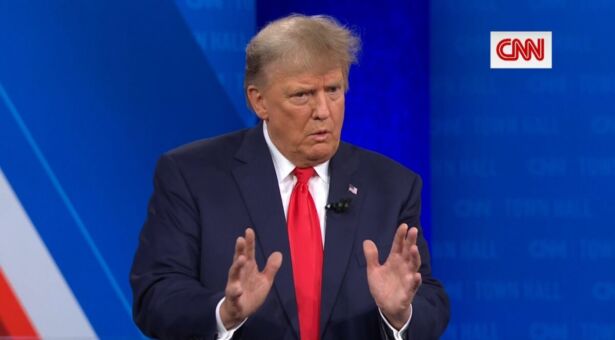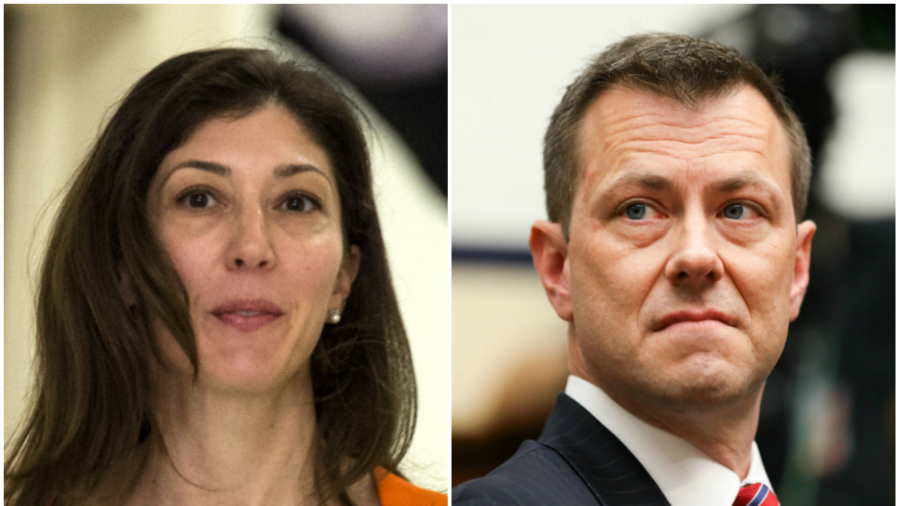The Department of Justice (DOJ) last week secured a court order to block former President Donald Trump from a deposition appearance in connection with lawsuits filed by former FBI officials Peter Strzok and Lisa Page.
“The deposition of former President Donald Trump is hereby stayed until the deposition of [F.B.I. Director] Christopher Wray and any ensuing motion practice as to the remaining necessity of the former president’s deposition have been completed,” the order reads in part. It was issued by U.S. District Judge Amy Berman Jackson on Thursday, May 11.
Strzok and Page were central figures in the controversy around the FBI Crossfire Hurricane investigation that had probed whether Trump had ties with the Russian government during the 2016 campaign. Text messages between the two agents showed the two making highly critical comments about Trump and his supporters as the two were working on that investigation.
Previously, Jackson had ruled that Wray and Trump could be deposed in connection to the lawsuits, according to court documents. U.S. DOJ lawyers had argued that Wray should be deposed first because he was ranked lower than Trump and that any information that he provided in the suit could mean that Trump would not have to testify.
“The Court is somewhat surprised to learn that since then, the parties have done nothing more than wrangle over the order of the two depositions,” Berman Jackson wrote. “The government seems chagrined that the Court did not order that the deposition of the FBI Director be completed first, but it may recall that it was the Court’s view that it was Director Wray, the only current high-ranking public official in the group of proposed deponents, whose ongoing essential duties fell most squarely under the protection of the doctrine in question.”
Berman Jackson, a senior judge of the U.S. District Court for the District of Columbia, was appointed by former President Barack Obama.

And in her order, Berman Jackson made reference to her February ruling that Trump and Wray could be deposed for two hours and limited questions to a “narrow set of topics” in connection to the lawsuits. Page and Strzok filed their complaints against the FBI and DOJ in 2019; Page’s lawsuit alleges her privacy was violated, while Strzok had contended that he was wrongfully terminated by the FBI.
In defending her earlier ruling, the judge wrote that it “was appropriate in light of all of the facts, including the former President’s own public statements concerning his role in the firing of the plaintiff,” according to court documents.
Trump repeatedly said that Strzok and Page were treating him unfairly during the FBI probe and often pointed to negative comments they said about him. After announcing his campaign for president last year, Trump made a 2024 campaign promise to clean out the “deep state,” a term used to describe entrenched federal bureaucrats who he said tried to block him while he was in office.
Ultimately, special counsel Robert Mueller’s probe essentially concluded that Trump did not collude with the Russian government to get elected. However, there were numerous unfounded claims about Trump that were aired on corporate media outlets that came from what appeared to be anonymous sources within the FBI and DOJ.
Strzok has alleged that the FBI had caved to “unrelenting pressure” from Trump when it fired him and that he was unfairly terminated for expressing his political opinions. As part of the lawsuit, Strzok’s lawyers have said they want to question Trump about whether he met with and pressured FBI and DOJ officials to fire him.
But the DOJ says that the former FBI deputy director, David Bowdich, has already said that he made the decision to fire Strzok on his own, and that he did not recall Wray ever telling him about any meeting in which the president pressured him about Strzok.
“These circumstances do not rise to the ‘extraordinary circumstances’ necessary to authorize the deposition of a current or former high-ranking government official, much less a former President,” the DOJ also wrote.
In his lawsuit, Strzok had alleged that “the FBI fired [him] because of his protected political speech in violation of his rights under the First Amendment to the Constitution of the United States.” Page contends the release of the text messages was unlawful and led her to be the subject of “frequent attacks by the President of the United States, as well as his allies and supporters.”
Attorneys for Page and Strzok have not issued any public comments with regard to her order. The former president was slated to testify in the lawsuits on May 24 before Berman’s order was handed down.
The Associated Press contributed to this report.
From The Epoch Times

